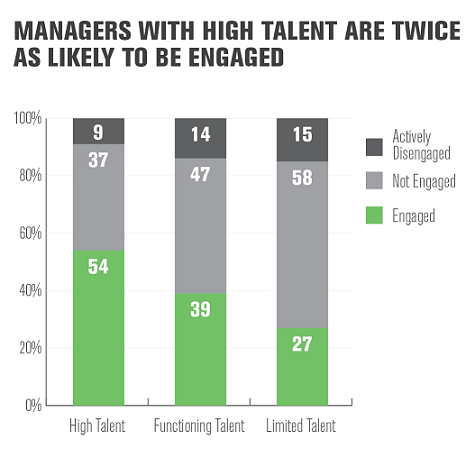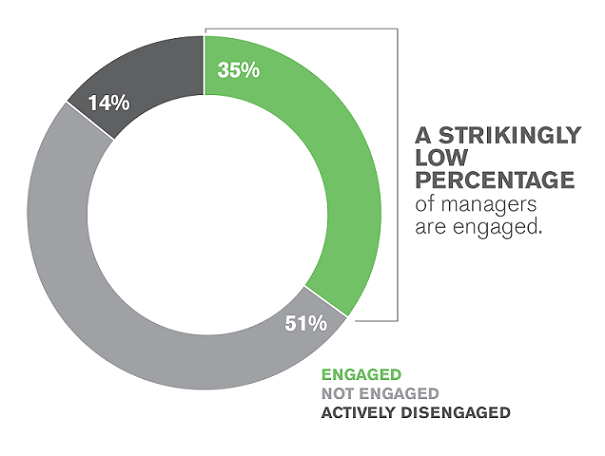Managers With High Talent Twice as Likely to Be Engaged
Friday, April 10th, 2015
Managers in businesses and organizations who have been identified as having high managerial talent -- a natural capacity for excellence -- are twice as likely to be engaged (54%) as managers who have limited talent (27%). Those who possess "functioning" or moderate talent are also significantly less likely than the most talented group to be engaged at work.

Fifty-four percent of managers who possess high managerial talent are "engaged" at work, while 37% are "not engaged." Conversely, 27% of managers deemed to have "limited talent" are engaged at work, while the majority, 58%, are not engaged in the workplace.
These findings can be found in The State of the American Manager report, which contains new insights about managers, and especially the talents that are required for effectively managing teams in organizations. Gallup conceives of talent as the natural capacity for excellence in a given endeavor. Everyone has talent in some areas, but few have the innate talent to become a great manager. Just one in 10 people have the unique blend of innate characteristics that Gallup has found to be predictors of management excellence, including the motivator, assertiveness, accountability, relationships, and decision-making talents. Another two in 10 have "functioning" talent, meaning they possess some of the traits but not all and, with the right coaching, can become successful managers. Just 18% of current managers have high talent, which means organizations are missing out on placing the optimal people in managerial jobs 82% of the time.
Managers with high talent lead teams that achieve higher employee engagement, higher productivity and higher employee retention rates, and have more engaged customers and 48% higher profitability. They are also more likely to be brand ambassadors for their organization than those with lesser management talent. Those with high managerial talent are twice as likely as those with low talent to strongly advocate for the products and services of their organizations and twice as likely to say they know what their organization stands for.
Manager Engagement Is Too Low
While 54% of managers with high talent are engaged at work, just 35% of all U.S. managers are engaged in their work and workplaces. Fifty-one percent of all U.S. managers are not engaged, and 14% are actively disengaged. Through their impact, Gallup estimates that managers who are not engaged or actively disengaged cost the U.S. economy $319 billion to $398 billion annually.

One reason for the high cost is that manager engagement has a direct impact on employees' engagement. Employees who are supervised by highly engaged managers are 59% more likely to be engaged than those who are supervised by disengaged managers -- leading to higher productivity, lower turnover, better-quality work, and higher profitability.
Implications
Managers influence everything that gets done in organizations. According to Gallup research, they may occupy the single most important role in workplaces throughout the world. They translate strategy into action and hold employee morale, turnover, productivity, safety and creativity in their hands. A great manager improves lives while improving performance. A poor manager makes workers' lives miserable while destroying performance.
Currently, only slightly more than 30% of employees in U.S. workplaces are engaged in their work and workplaces. This figure has hardly budged in nearly 15 years. But it doesn't have to be that way. Some organizations have 70% engagement or higher, and this hasn't happened by chance. They outpace their competitors in financial performance and make the lives of their employees better in the process. But most organizations are still struggling to improve the morale of their workforces and their performance. There is a root cause: They don't have enough great managers because they have placed people into the position of manager for the wrong reasons. Tenure or success in a prior nonmanager role, while seemingly equitable reasons on the surface, aren't the right reasons. Great managers have different natural talents than average or below-average managers. And they continue to improve if their organization sets the right criteria for building a productive culture.
Managers, through their natural talents, their own engagement and their behaviors explain at least 70% of the variance in engagement across teams. Few organizations have enough great managers. And there is no other job that has as much combined influence on American business success or failure as the manager.


